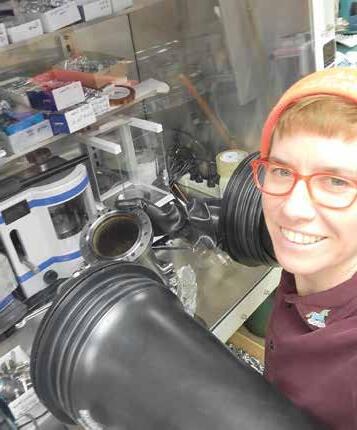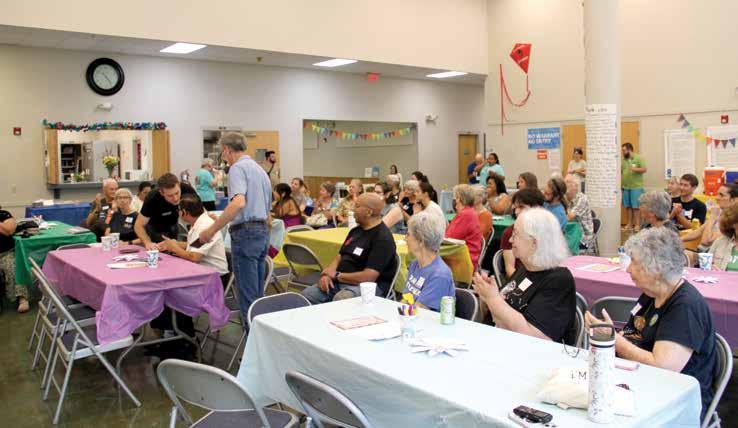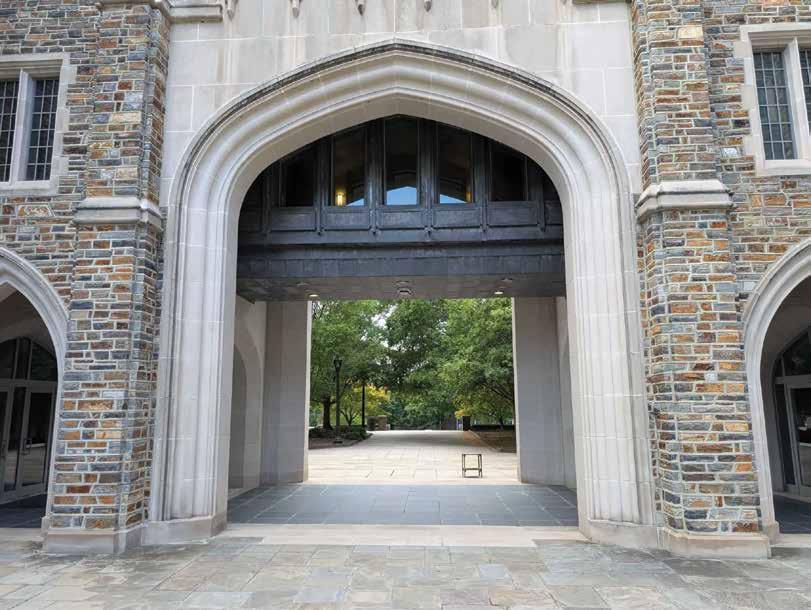




September 3, 2025

Raleigh | Durham | Chapel Hill



















September 3, 2025

Raleigh | Durham | Chapel Hill



























By Sarah Edwards p. 16







When beloved Raleigh musician Tift Merritt rummaged through her archives for a 20th anniversary reissue of Tambourine, she found she still had plenty of material to mine.

6 Local businesses are getting crash courses in constitutional law to prepare for potential encounters with ICE agents. BY LENA GELLER
8 Duke librarians supporting Slavic, Islamic and Jewish studies received buyouts at a time when those areas are central to international conflicts. BY MATT HARTMAN
10 Three Durham neighborhoods are beginning to develop small area plans to guide future development with community input. BY
12 New Hill in rural Wake County is now among communities across the country grappling with the impacts of massive data storage facilities used to power technology and run ever-more powerful AI. BY JANE PORTER
14 Kids in Apex are lobbying local leaders to build a bike trail after the town said the jumps they built in their neighborhood had to be removed. BY JANE PORTER
16 This month, Raleigh musician Tift Merritt is issuing a special two-part release for the anniversary of her second album, Tambourine. BY SARAH EDWARDS
18 An action thriller from Paul Thomas Anderson, a dark comedy about spousal warfare, and more films coming to Triangle theaters. BY GLENN MCDONALD
20 Lunch Money: A visit to Global Suq, a Palestinian-owned market and grill in Durham. BY LENA GELLER
22 In a new essay collection, Before They Were Men, Triangle author Jacob Tobia asks readers to imagine the ways the patriarchy has created suffering for men and boys. BY JASMINE GALLUP

Made This
In August, Lena Geller wrote about a Chapel Hill couple who lost nearly everything in Tropical Storm Chantal. They are stuck in an increasingly common situation, Lena wrote: Their home is vulnerable to flooding, but unable to sell, they have nowhere else to go. Readers shared their reactions.
From reader JULI BIERWIRT by email:
Good article and great reporting. I thought there might be something valuable to add. As of just a few years ago it was not required to report prior flooding to prospective homebuyers. Just over a year (August 2024) ago that changed. We got stuck in that trap having purchased our home in Chapel Hill in 2022 and having it flood now in 2025. We found out the property had flooded before from a neighbor but we were not informed when we bought as it was not legally required. Not only did that increase the sale price when we purchased (relative to what we will now have to sell it for), but it left us unprepared to purchase flood insurance.
This is an issue for everyone in Chapel Hill with property that flooded, even if it was a relatively uncommon incident.
From Bluesky user HANKYJG:
Great story. I grew up in this part of town. My 2¢ is that those apartments were built on existing impervious surfaces and require less additional road to access than nearby single-family homes, making each unit (to my mind) a good policy choice in terms of stormwater impacts per person housed.
Ideally we wouldn’t have built anything on that scale there to begin with, but because we did, I’m generally supportive of converting existing runoff creators into a bigger tax base to deal with impacts/ stormwater project concessions.
This is an area near us. In America now, make one serious mistake and unless you have wealth or a needed skill you are done. Happily we are higher than them; and about the highest house on our street. FEMA, I think, has bought endangered houses and destroyed them; no more.
From Bluesky user GALAXYGAZE:
Thank you for this story, I’m always horrified to read them but by shining a spotlight on climate disasters, I weirdly get a bit more hope about something being done to change our course :(
Jane Porter reported online (and on page 12 of this edition) about a proposed data storage facility in rural Wake County and neighbors’ concerns about pollution, noise, and the environmental repercussions of the massive facility.
This is near me. Data centers are increasing as crypto and AI use up all our power. I hope the homeowners can show up tonight and put this bad idea down. Apex water comes from Jordan Lake. Jordan Lake has PFAS. The Haw River concentrations are greater near Pittsboro, this is a big problem.

The president’s cuts to scientific research will be felt for years to come. A Cary high school graduate studying planetary science urges Triangle-area representatives to fight for our universe.
BY BP BLAKLEY backtalk@indyweek.com
It’s hard to believe it’s been 20 years since my graduation from Cary High School. I remember learning about the Doppler Effect in my 12th grade physics class. The teacher, Mr. Philip Goodloe, sent a classmate outside to run past the window yelling (“at a constant pitch!”). We heard our classmate’s pitch getting higher as he came closer to the window, then suddenly dropping after he passed—while the teacher in the next room reassured their class: don’t worry, it’s just a physics demonstration!
Twenty years later, I’m now a second-year Ph.D. student studying planetary science at Johns Hopkins University. I followed a winding path to get here, but I trace it back to my childhood in the Research Triangle, surrounded by scientific discovery and support-

ed by the economic prosperity it provided.
In 2021, after spending a decade working in marketing, I decided to go back to school. While I had been relatively successful in business, I lacked the passion for it. I wanted to get back to my roots, to follow my curiosity and serve the people of my community and my country by expanding the frontier of human knowledge.
NASA provided both inspiration and opportunity. Through their science communication efforts, I learned about the field of planetary science. I was amazed by the discovery of clay minerals on Mars—evidence of flowing water sometime in that desert planet’s past. Through two NASA-funded internships, and one summer position funded by the National Science Foundation (NSF), I was able to get research experience and go back to school.
Now, I do laboratory research about Saturn’s largest moon, Titan, a world larger than our own moon with an atmosphere thicker than Earth’s, with lakes and flowing rivers of methane and a subsurface ocean of liquid water. I feel grateful every day for the chance to investigate this strange version of Earth, and what it might have to teach us about the origin of life and our place in the universe.
Unfortunately, if President Trump’s proposed FY2026 budget is passed, our country will be giving up on curiosity. The proposed cuts to NASA Science and NSF—47 percent and 57 percent respectively—would be an extinction event for American scientific research. Already, opportunities like the ones I had are being drastically cut or canceled. Universities that host undergraduates for summer research through NSF’s

Research Experience for Undergraduates (REU) program have withdrawn offers due to canceled funds. REU internships are one of the major pathways to graduate school, especially for underrepresented groups and students at small or rural colleges. Graduate programs like mine have slashed their acceptance rate—my incoming class was ten students, but the class starting this fall will be three. Perhaps worse, fewer than half of the graduating students from my program this spring have found a research job. Of the graduating students that did find work, half are moving abroad.
The U.S. isn’t just losing scientists and future discoveries—the economic loss of cutting federal research funding is massive. The budget cuts to just the National Institutes of Health (NIH) and NSF are estimated to cost at least $10 billion per year. In the Research Triangle, the economic impact will reverberate through every sector—$1.8 billion and over 200 jobs have already been lost in the Triangle directly due to canceled NIH grants. That’s not counting indirect losses, or losses from canceled NSF or NASA grants, or future losses if the president’s proposed budget is passed.
The impact of the president’s proposed budget cuts will be felt for years into the future. While my journey into space science has taken me away from the Triangle, I visit my family in Cary and Durham often. My nephew, who will be ten years old this
October, has a growing interest in geology.
My niece turned five in April, and her curiosity about the natural world is starting to bloom. Sharing in their sense of wonder about the universe is one of the greatest treasures of my life. But I worry: Will they have the same opportunities I’ve had to follow their curiosity? I didn’t give up on my curiosity. Will we, as a country, give up on it? I hope not. But it’s up to all of us to make sure that scientific careers don’t end before they start. As the recent Supreme Court ruling on NIH grant cancellations has shown, lawsuits and other reactive efforts aren’t likely to be successful under this regime.
Lawmakers must act proactively to protect federally funded research. I urge you to call your representatives in the U.S. House and Senator Thom Tillis (in Raleigh at 919-8564630) and tell them how the budget cuts have and will affect you. Ask them to support the Senate’s version of the Commerce, Justice, & Science (CJS) spending bill and to fully fund federal research agencies. Talk to your neighbors, friends, and loved ones and ask them to speak up with you. It’s time to stand together and fight for our future—the universe is at stake. W
BP Blakley is a second-year PhD student studying astrobiology and icy worlds in our solar system at Johns Hopkins University. They grew up in Cary and lived in Wilmington and Raleigh.
These stories are part of our ongoing series, Ask INDY, in which INDY staffers put their expertise (and impeccable taste) to use answering your questions about navigating life in the Triangle.
BY LENA GELLER backtalk@indyweek.com
Ihave a core memory of eating the brussels sprouts pizza at Durham’s Pizzeria Toro as a kid. I trusted pizza, so when it showed up covered in scary vegetables, I gave it a shot. That meal not only made me hip to brussels sprouts, it induced the realization that I’d been propagandized by the lamestream children’s media to think some foods were objectively icky. Going forward I was more open to foods that kids are taught to hate. This week’s Ask INDY question came from a reader looking for a similarly instructive experience:
I’m looking for places to eat with my young kids—we aren’t trying to take them to breweries, but are looking for spaces where they can learn how to behave in a restaurant and try new foods without necessarily ruining other people’s meal if they don’t get it right the first time.
For building restaurant skills in a lowstakes environment, look for spots that are a little noisy, like Toro, or have a small array of outdoor seating—that way, you can’t hide out and make a huge mess, but there’s enough of a cushion that you aren’t disrupting date nights in the event of a meltdown. More praise for Toro: the place stays busy enough that nobody’s tracking your family’s noise level and the wood-fired oven is visible from the dining room, which makes for good entertainment.
Places with open kitchens or interactive elements can also work wonders for behavior. When kids are able to watch their noodles being pulled or choose what goes into their bubbling hot pot, they’re engaged enough to forget about staging chaos. And for success in expanding palates, find restaurants where customizing dishes is the norm, or that serve unfamiliar flavors in familiar formats.
Also in Durham, Rose’s Noodles, Dump-
lings, and Sweets hits all the marks with refined-yet-approachable food in a bustling space with an open kitchen and cozy outdoor seating. The katsu sando starts with something kids like—fried chicken— then soft-launches new flavors like tonkatsu sauce. The steamed buns are basically savory Uncrustables.
Interactive dining is easy to find in Cary, which has a strong Korean BBQ and hot pot scene. At places like Seol Grille and So Hot Hotpot, kids (particularly older ones) can keep their hands busy and make their food as plain or spiced up as they want. You might find that the control makes them more willing to experiment.
Many cultures recognize that hands are perfectly good utensils. Kids intuitively get this. Indian spots like Lime & Lemon, with locations in both Chapel Hill and Durham, serve entrées alongside naan that can function as edible silverware. Yagg Sii Tenn, a pan-African restaurant in Apex, has a corner with floor cushions where customers are invited to eat traditionally with their hands. A final note: learning how to behave in restaurants extends beyond sitting still and using napkins. I think a lot of kids grow up seeing their parents lose it on waitstaff. Be polite and patient. Tip well. Don’t ask the server to smile more. Your kids are watching how you treat people who are serving you, and that lesson will last long after they grow out of the food-throwing phase.
County Board of Elections
Tuesday, October 7, 2025
The 2025 Municipal Primary Election for City of Durham Mayor and Council will be held in Durham County, NC on Tuesday October 7th. All precincts, excluding Precinct 26, will be open from 6:30 am until 7:30 pm. Precinct 26 – Rougemont will not be open because no city/town area lies within the precinct boundaries.
17-year-old City of Durham voters who are registered and will be 18 years old on or before Nov. 4, 2025, may vote in the Primary Election.
The following contests will be on the Primary Ballot:*
• City of Durham Mayor
• City of Durham City Council - Ward 1
• City of Durham City Council - Ward 2
• City of Durham City Council - Ward 3
* The primary for these contests will only be required if three or more candidates file for the respective office.
Absentee By-Mail: Absentee by-mail voting begins on September 5, 2025. Absentee by-mail ballots can be requested fully online at the following link: https://votebymail.ncsbe.gov/app/ home. Be sure to request your absentee by-mail ballot no later than September 23, 2025, at 5:00 p.m. All absentee by-mail ballots must be returned to the Board of Elections no later than 7:30 p.m. on Election Day.
Election Day: All active polling places in Durham County will be open on October 7, 2025, from 6:30 a.m. – 7:30 p.m. To find your Election Day polling place, please use the State Board of Elections Polling Place Lookup Tool at the following link: https://www.dcovotes.com/voters/ voting/polling-locations.
Early Voting: Early voting in Durham County will occur from Thursday, September 18, 2025 –Saturday, October 4, 2025. Hours are consistent at all five early voting sites and are as follows:
• Weekdays: 8:30 a.m. – 6:00 p.m.
• Saturdays (Sep. 20th and 27th): 8:30 a.m. – 1:00 p.m.
• Saturday (Oct. 4th ): 8:00 a.m. – 3:00 p.m.
• Sundays (Sep. 21st and 28th): 12:00 p.m. – 4:00 p.m.
DURHAM COUNTY EARLY VOTING LOCATIONS
South Regional Library 4505 S. Alston Ave., Durham North Regional Library 221 Milton Rd., Durham East Regional Library
Voter Registration Deadline: The voter registration deadline for the 2025 Municipal Primary Election is Friday, September 12, 2025 (25 days prior). Voters that miss the registration deadline may register and vote during the Early Voting period. Voters who are currently registered need not re-register. Registered voters who have moved or changed other information since the last election should notify the Board of Elections of that change by September 12th. Party changes are not permitted after the voter registration deadline. For more information, visit our website at https://www.dcovotes.com/voters/registration
Same Day Registration: Voters are allowed to register and vote during early voting. It is quicker and easier to register in advance, but if you have not registered you can do so during Early Voting with proper identification. This same day registration is not allowed at polling places on Election Day. For more details on the requirements associated with Same-Day Registration during Early Voting, visit our website at https://www.dcovotes.com/voters/voting/early-voting
Information regarding registration, polling locations, absentee voting, and other election matters may be obtained by contacting the Board of Elections.
Website: www.dcovotes.com
Check out past Ask INDY columns at indyweek.com/ask-indy
Phone: 919-560-0700
Email: elections@dconc.gov Fax: 919-560-0688

From coffee shops to electrical contractors, businesses are getting crash courses in constitutional law to prepare for potential encounters with federal agents.
BY LENA GELLER lgeller@indyweek.com
The volunteers meet inside a Carrboro coffee shop on a muggy late-July afternoon.
All three are self-described introverts, which makes the door-to-door effort they’re about to embark on— recruiting businesses for ICE defense training—a bit daunting, even for Ashley Trudeau, the one experienced volunteer.
Trudeau spreads her toolkit across the table to show the two newbies the materials they’ll use for canvassing.
“I really like this one and I lean on it a lot,” she says, pointing to a half-sheet titled “IF A FEDERAL AGENT ENTERS” with steps to take: Ask agents to identify themselves. Ask if they have a judicial warrant. Film the interaction. And so on.
The goal of the canvass is to get local businesses to become “Fourth Amendment Workplaces.” In the simplest sense, that means getting owners to commit to informing their staff of what the Fourth Amendment is—protection against unreasonable searches and seizures—and having
a game plan in the event that federal agents show up to conduct workplace raids.
When businesses look at that “IF A FEDERAL AGENT ENTERS” sheet, Trudeau says, they often realize they aren’t prepared.
Over the next hour, the volunteers visit 11 businesses along Carrboro’s main drag. At most places, decision makers aren’t around, but staff are appreciative of the effort and agree to pass information to their managers. An employee at a gift shop says he’s eager to have a more concrete protocol in place.
“At this point I’m literally just going to throw stuff at them and run into the back room and lock it,” he says of Immigration and Customs Enforcement agents hypothetically showing up.
Just one business owner is present in his establishment during the canvass. He agrees to sign on, but only after
Trudeau explains that there’s an option to go on the “quiet list,” meaning his business will receive training and information but won’t be publicly identified as a participant.
The moment highlights the dual strategy of the Fourth Amendment Workplace initiative, which the immigrant rights organization Siembra NC launched in April. Part of the approach relies on visible community support as a deterrent to raids on workplaces. Over 200 businesses statewide have signed on, most publicly. Orange County has 43 participating workplaces. Durham and Guilford Counties have dozens more. Even businesses in redder counties like Johnston have joined. Siembra strategically began by recruiting established businesses that don’t employ many immigrants to create a protective buffer for more at-risk workplaces, says organizer Andrew Willis Garcés.
“We think that the most vulnerable workplaces are going to be less likely to be targeted if there are high-profile, high-foot-traffic businesses saying the fourth amendment is important,” Willis Garcés says.
But the practical applications of the initiative are equally crucial, which is why the second strategy of participating quietly is still valuable. Siembra has documented three workplace raids in North Carolina this year, including a major raid at Buckeye Fire Equipment in Kings Mountain in June that led to 30 arrests. ICE arrests statewide are up 170 percent. And Willis Garcés sees the threat extending far beyond immigrant communities.
“I think a thing that we’ve learned from the last couple of years is, solidarity isn’t enough,” Willis Garcés says. “With Project 2025, and Trump’s campaign pledges at his rallies, he basically said he was going to find a way to target all kinds of Americans. How he would target immigrants was the headline most of the time, but the blueprint is there, and we’re seeing it now, how he would dismantle protections for all kinds of people. So we think it’s important that basically that is matched with the number of people organizing in collective self defense.”
When businesses sign on to become Fourth Amendment Workplaces, volunteers from Siembra conduct on-site trainings that involve a range of preparations: role-playing encounters where employees practice asking agents to identify themselves while someone films; walking through the space to designate which areas are “private” (break rooms, offices, anywhere marked “Employees Only”) since ICE needs a judicial warrant to enter those zones but not public areas; and examining sample warrants to spot the difference between administrative ones that ICE issues to
itself and judicial ones signed by a judge.
“If they want to do something illegal, they will,” Trudeau says, of ICE, while pitching the initiative to an employee in a Carrboro hair salon. “But they’re also using psychological terrorism. Knowing what we’re allowed to do, and not making it easy for them, can help.”
At the United Church of Chapel Hill on an August afternoon, traditional dancers in feathered headdresses perform for a crowd gathered around tables with colorful tablecloths. They kick their legs and spin to the beat of a drum while attendees— volunteers, business owners, local electeds, and Siembra organizers—occasionally break away to the buffet table, where aluminum trays of tacos are steadily depleting alongside bowls of red and green salsa labeled “mild” and “hot.”
The gathering is meant to celebrate both local success and national momentum tied to the Fourth Amendment Workplace initiative, which is being adapted and implemented in 14 other states. In Oregon, organizers have formed a “Baddies for the 4th” group; in Ohio, the City of Cleveland Heights is preparing to pass a resolution proclaiming itself a Fourth Amendment Workplace.
The Town of Carrboro passed its own such resolution in May. Durham was expected to follow suit Tuesday night, after this issue went to press.
After the dance performance, a series of speakers take the microphone to tout milestones of the initiative, and there’s something slightly disorienting about celebrating a credentialing system that was invented four months ago and hasn’t yet been tested in a real ICE encounter. But beneath the novelty, there’s a subtext: no mode of resistance that already existed felt adequate or accessible. The traditional playbook—donating to Democrats, posting on social media—is part of the machinery that led to this moment. Siembra’s approach works outside those channels, building power through direct action and hyperlocal community building that doesn’t depend on institutions to save anyone.
“I feel really strongly about just being able to stand up and do something right now,” says Brad Bonneville, whose electrical contracting company joined the Fourth Amendment initiative in the spring. “I’ve been kind of waiting for this whole debacle to unfold most of my life, as things have moved in this direction, with the climate and with politics. And now that it’s happening, it’s like, feeling totally unprepared.”
Part of the celebration’s stated intent is to infuse joy into resistance work as a counter to the fear gripping local communities.
“No papers, no fear, the community is organizing here,” raps Marco Cervantes, an organizer.
“You don’t actually have to be scared of despots,” says Carrboro town council member Cristóbal Palmer, adding that his grandfather fled Poland in 1938 and later fled Peru when it turned autocratic. “Historically, looking around the world, they actually end up being quite fragile because they have to be paranoid. So we need to just stand together, find our community, and we will get through this.”
But the buoyant mood is fraught with underlying tensions. Bonneville, the electrician, is shaking as he speaks. His employees all have their paperwork, he says, but their friends and families might not. If he becomes a target, he worries ICE could come after them. He’s caught between contradictory fears: the “fear of spending my life knowing that I hadn’t spoken up during a time of sea change when our rights are being rescinded,” he says, reading from notes he’s scribbled down. “And the fear of what happens if I do speak out.”
The next phase of the Fourth Amendment Workplace initiative involves putting pressure on municipalities to help scale the program. The Town of Carrboro has begun setting up workshops for businesses through its economic development office, which has relationships with all 600 businesses in town.
On the ground, volunteers are still figuring out the best approach—whether doorto-door canvassing or word-of-mouth and personal relationships yield better results.
During the July canvass, even though employees were enthusiastic, it seemed unlikely that any of them would follow up, as goes cold outreach. “I always wash business cards,” one coffee shop employee told the group, then asked them to write information down on a scrap of paper, which seemed even less promising.
But sometimes the combination of grassroots effort and personal connections pays off. One business the group canvassed did follow up—Speakeasy, a bar on Weaver Street. As it turned out, one of the newbie volunteers had gone to grad school with the owner, Nona Poulton, which helped bridge the gap between interest and commitment.
Speakeasy just completed its training this week. Poulton, who’s also a nurse practitioner, says she views the Fourth Amendment Workplace initiative as something akin to herd immunity.
“Am I worried about our workers in our business? Not at the moment,” she says. “Not currently. But I can’t say that that won’t change.” W





Duke Libraries said the Department of Slavic & Eurasian Studies department would be eliminated. College leadership says that’s not true.
BY MATT HARTMAN matt@theassemblync.com
In a presentation last month about the impact of Duke University’s cost-cutting efforts on their work, Duke Libraries leaders told their employees that they would no longer provide dedicated support to Russian-language collections due to the “elimination of Duke’s Department of Slavic & Eurasian Studies.”
Leaders from Duke’s Trinity College of Arts & Sciences, which includes the department, were surprised to hear it.
“To be clear: no such decision has been made,” Owen Covington, Trinity’s associate dean for communications and marketing, said in a statement later that week. “In fact, Trinity has been active in retaining and hiring faculty in this department during the past year.”
Covington did note that Slavic & Eurasian Studies (SES) has been in “preliminary discussions” about a merger with the Department of German Studies for over a year, but he said nothing has been decided.
“Those discussions are ongoing and Trinity College will not get ahead of its faculty in considering changes of this kind,” he wrote.
The mix-up is emblematic of the confusion spreading across campus as Duke continues layoffs, which follow a round of buyouts. With policies and timelines differing among Duke’s disparate departments, university leaders are struggling to provide clear infor-

mation to their anxious faculty and staff.
The Slavic department was already small before the ongoing cuts began, with eight permanent faculty members and two dedicated staff who spent a quarter of their time supporting another department. Then both staff positions were eliminated as part of the cost cutting, as was the librarian specializing in Slavic studies, who supported their work.
Jehanne Gheith spent the last year of her term as chair, which ended in June, sharing duties with the chair of German Studies, who was not previously affiliated with SES, because no other SES faculty could take it on. Now he is the lone SES chair and will lead both departments, Gheith told The Assembly and the INDY.
She added that she is “stunned” the university would make such drastic cuts to Russian studies when the Russia-Ukraine war is upending the geopolitical balance.
“Training experts in Russian and Slavic is going to be really important in the coming years,” Gheith said. “I think the deans get that. I don’t think at higher levels they understand how often the U.S. gets caught short.”
Her frustration has been amplified by the process leading to this point.
Gheith didn’t realize Trinity leaders had already decided which staff members would receive buyout offers until the morning she
met with them this spring. She thought it was just a regular check-in meeting with the dean of the humanities.
Gheith said she was told during the meeting that working in a department that may be merged with another was one of the criteria for selecting which staff would receive a buyout offer, though that was retracted in later conversations.
“I never had a sense that I had any control,” Gheith said, adding she was asked for input.
Now, she is left confused about why the library would continue supporting German but not Russian if the two departments will merge. And while she is still excited that SES is hosting the acclaimed and exiled Russian journalist Elena Kostiuchenko as a visiting scholar for the year, she wants to ensure the department can provide a robust experience.
Gheith also worries that SES won’t be the only humanities department to suffer stringent cuts, and she’s not alone.
Three other international area studies librarians received buyouts in addition to the Slavic librarian, according to a list of departures sent to library staff and obtained by The Assembly and INDY. That included those specializing in Jewish and Islamic Studies—both sides of the other war embroiling international politics.
Joseph Salem, the head of Duke Libraries, wrote in a public message in August that
his team would “scale back support for subject areas where the university is also scaling back.” That prompted concern among other faculty, including departments like Asian & Middle Eastern Studies.
“I already had a long exchange about this sentence with the provost and” Salem, said Shai Ginsburg, the department’s chair.
Ginsburg noted that the Arabic program has been growing in recent years, as has Korean, which also lost its librarian.
Though his department has not lost any staff members in the cuts, Ginsburg is frustrated with the lack of transparency.
“There was no strategic plan that was shared with the faculty about where this university is going intellectually,” Ginsburg said. “It’s a small university to begin with. It cannot invest in all areas of knowledge. But there’s never a true discussion—I’m not talking about grand, empty visions about ‘excellence in research’ and what have you—mapping the university, where to invest, how to sustain the humanities. There’s no road map.”
Trinity leaders did not respond to a question about whether other area studies would be scaled back. W
Disclosure: Reporter Matt Hartman worked at the Trinity College of Arts & Sciences from 2019 to 2024.








Residents in Lakewood, Lyon Park and West End are beginning to develop small area plans, roadmaps for neighborhood growth based on community input.
BY JUSTIN LAIDLAW jlaidlaw@indyweek.com
Following the successful adoption of Durham’s first Small Area Plan (SAP) for the Walltown neighborhood, the residents of Lakewood, Lyon Park, and the West End are preparing to develop plans of their own.
Small Area Plans are specific vision statements within the city’s comprehensive plan—which guides future development—tailored to individual neighborhoods. The Durham city council passed an update to the comprehensive plan in 2023, but the broad scope didn’t address concerns of residents in some of Durham’s unique neighborhoods.
Last week, nearly 70 residents gathered at the Community Family Life & Recreation Center at Lyon Park to discuss the future of the three adjoining neighborhoods. Durham city planning staff gave a brief presentation on the history of SAPs, ground rules on what they can and can’t accomplish, and what makes this planning process different from Walltown’s, before residents broke out into working groups to brainstorm ideas for the new plan.
At each table, markers and large sheets of paper were laid out for residents to record their ideas. Folks coalesced around many tried-and-true concerns: affordable housing, green space, traffic safety, and activities for the youth. Discussions about density and adding new amenities to the area teetered between YIMBY and NIMBY as residents tried to balance growth, long-term affordability, and protecting the environment.
Aroham Dutt moved into the area five years ago after living in an apartment downtown. He says it’s important for his new neighborhood to “grow responsibly” and preserve its

unique character. A way to accomplish that goal, he says, is by supporting the local entrepreneurs who live there.
“I want to see a focus on businesses that are run by people that live in the community.” Dutt says. “My neighbors run the businesses around me, and I love that, and I don’t want that to change.”
Dutt abashedly espoused a vote for more density as a way to introduce a higher variety of housing opportunities in the area. The Shoppes at Lakewood has an excess of oft-unused parking spaces where residents suggested building additional green space like the parklet next to El Futuro. Community members have already started to come up with creative uses for the lot; Scrap Exchange is partnering with Manifest Skate Shop to build a skate park on the site.
The comprehensive plan, and by extension, small area plans, are just visioning documents. They don’t include any mechanisms for enforcement.
“The small area plan is not the law; it is not legally binding,” said Sarah Long, community planner with the Planning Department, during last week’s meeting.
That responsibility falls to the unified development ordinance (UDO), a set of rules and regulations that says which types of development can go where. The planning department is in the process of rewriting the UDO and a draft is available on the city’s website, though Lisa Miller, Durham city planner, said community engagement is ongoing.
While SAPs lack authority, they still have merit. SAPs provide the city council with a community-informed guide
for future planning and development decisions in the neighborhood, taking into account transportation and connectivity needs, environmental challenges, and areas of opportunity for future projects on locally owned public land.
The city began the process for its first small area plan in 2024, partnering with the Northgate Mall Neighborhood Council—a consortium of representatives from Walltown, Trinity Park, Northgate Park, Trinity Heights, Watts-Hillandale, Old West Durham, and Duke Park—to develop a pilot.
On August 18, Walltown residents received highly anticipated news when the city council voted unanimously to formally adopt the Walltown small area plan. But while Walltown residents are excited to have their neighborhood’s vision codified, there’s still work to be done for the plan to come to life. Development on the former Northgate Mall site has been gridlocked since 2018 when Northwood Ravin, a global real estate firm, purchased the property. The firm hasn’t been able to reach a consensus with neighbors on a vision for the project. Brandon Williams, a Walltown resident who helped lead the process on behalf of the Northgate Mall Neighborhood Council, is hopeful the new small area plan will help rekindle the conversation.
“The big win is getting our priorities around Northgate into official policy guidance,” Williams says. “The clear next step is trying to figure out a way to bring Northwood to the table. And obviously our concern is that the UDO process needs to ensure that they’ll have a reason to be at the table.”

Residents are raising concerns about a proposed data storage facility in rural Wake County.
BY JANE PORTER jporter@indyweek.com
Adozen black cows graze by the side of Shearon Harris Road, on 189 acres just south of Old U.S. Highway 1 in New Hill, a rural, unincorporated town in western Wake County. Some rustic-looking farmhouse structures sit further back on the property, framed by gently sloping hills.
The Western Wake sewage treatment facility sits directly to the west of the farmland, and Duke Energy’s Shearon Harris Nuclear Power Plant is located just three miles to the south.
“We are a terrorist attack waiting to happen,” remarked a resident of the nearby Jordan Pointe neighborhood at a community meeting on August 21.
“And we’re surrounded by schools,” another neighbor added. “I mean, this is just such a recipe for disaster.”
Jordan Pointe is a decade-old master-planned community that features more than a few million-dollar-plus homes. At the neighborhood’s poolside cabana, a group of two dozen residents discussed how best to organize opposition to a massive data storage facility proposed for the Shearon Harris Road farm property. They wouldn’t be the only ones affected; two more large communities are planned on either side of Jordan Pointe, each with hundreds of new homes.
Just two days earlier, Jordan Pointe residents met with the developers and learned more about the project stoking their concerns. The data storage facility, according to notes taken by a resident and reviewed by the INDY, is a proposal from Maryland-based developer Natelli Investments LLC. Preliminary plans call for four to six buildings, up to 75 feet tall, and 80 three-megawatt generators on the site that would be used during power outages and tested weekly. A 60-foot buffer would surround the perimeter of the property.
As large data facilities pop up across the country to power technology and increas-
ingly run ever-more powerful AI, residential communities are grappling with their impacts. These include the staggering amounts of water—up to millions of gallons a day—and electricity they require.
It’s not clear how many data storage facilities are located in North Carolina—the state doesn’t keep an official list and some of their locations, including those housing government data, are kept secret—but “data centers exist, humongous and modest, in rural counties and in cities,” a March News & Observer report found.
Apple, Meta, Google, and Microsoft all have large centers in western North Carolina. And the Triangle is already home to some small facilities, including TierPoint in RTP, CyrusOne in Durham, and a new American Tower facility along Chapel Hill Road in west Raleigh that opened this spring.
Concerns voiced at last month’s meeting at Jordan Pointe ranged from health and quality-of-life impacts, including air pollution from burning fossil fuels, noise and light pollution, and the costs and environmental repercussions of using energy from the power grid and clean water from the treatment facility.
According to notes from the developer’s meeting with neighbors on August 19, Natelli Investments LLC is a third-generation real estate firm that shifted to data center projects five years ago and has built similar facilities from South Carolina to Maryland.
The attorney for Natelli Investments LLC, Beth Trahos of Fox Rothschild LLP, who is listed as the contact person for the project, did not respond to questions from the INDY. A day after this story published online, a spokesperson from North Carolina-based RLF Communications sent a media statement from the developer, Michael Natelli, the executive vice president of Natelli Holdings, confirming that the company is in the early stages of plan-

ning a data center on the site.
“This property is designated for future industrial development in the Town of Apex’s Comprehensive Plan and is an ideal location for this type of development that is critical to North Carolina’s continued growth and economic success,” the statement reads.
“More than $1 billion will be invested to bring this project to life, including stateof-the-art measures to mitigate noise, use non-potable water drawn from the wastewater system and securing power directly from Duke Energy. We look forward to sharing additional information when we file rezoning and annexation applications with the Town of Apex, and we will continue to gather input from the community as we proceed with this project.”
The company has been evaluating the parcel of land at 4232 Shearon Harris Road for over a year, the developer’s representatives told neighbors at the meeting. The proposal requires the 189-acre site to be annexed into the Town of Apex followed by a rezoning from residential to light industrial that would require a text amendment to the town’s development ordinance to add a definition of a data storage facility.
The developer aimed to file the annexation, zoning application and text amendment by September 2 according to slides from a pre-
sentation the INDY viewed. According to real estate records, the property is still owned by Michael L. Goodwin; it’s not clear whether the sale of the property is contingent on the developer getting the annexation and rezoning. It’s also unclear why Natteli Investments LLC wants to be annexed into Apex rather than asking for the rezoning from Wake County. Representatives for the developer pitched the community on the project’s economic benefits, neighbors say, including: an estimated $10 million in annual tax revenue for Apex and Wake County, plus an additional $1.2 million in tax revenue to the state; $300 million in compensation for construction labor; and $850 million in additional economic contributions—lodging, food sales, materials costs—during the construction period.
According to the neighbors’ notes, the proposed data storage facility would require around 250 megawatts of energy—the equivalent of 25 percent of Shearon Harris Nuclear Plant’s 1 gigawatt output—that will come from the existing energy distribution grid. Duke Energy is conducting a feasibility study to confirm power availability (the results of which might not be shared publicly), but neighbors say it seems clear that the facility will require more power than what’s currently available.
“From a financial point of view, there’s [likely] going to be some infrastructure upgrades, and there is a cost aspect of infrastructure upgrades, which is most likely going to pass through to the communities,” says Jordan Pointe resident Sarav Arunachalam, an adjunct professor in the Department of Environmental Sciences and Engineering at UNC’s Gillings School of Global Public Health.
Arunachalam notes that, while North Carolina used to rely on burning coal, in the last two decades the state has come to rely more on natural gas.
“Natural gas is still a fossil fuel, and if you’re going to have excess capacity somewhere in the grid, in Duke Energy’s portfolio, then it’s going to lead to excess emissions of carbon, excess emissions of other pollutants which cause both air quality and health risks in the near term while carbon dioxide impacts are more of a long-term issue for climate change,” Arunachalam says.
The generators, too, could require burning fossil fuels, potentially diesel, for power. Exposure to diesel exhaust can inflame the body’s T cells and alter their response, which can be harmful to people with asthma and could trigger autoimmune and allergic responses.
And the use of treated wastewater, sourced from the Western Wake Regional Water Reclamation Facility, which is jointly owned by the Town of Apex and the Town of Cary, could also contribute to air pollution. That water could be pumped through pipes housed inside the facility to cool machines powering the operations of cloud computing, data analysis, or the functions of tech corporations, governments, and other entities storing data and providing internet services.
According to the neighbors’ report-out from the meeting with the developer, about one third of the water the facility utilizes will evaporate and the rest will cycle back to the treatment facility. Evaporated water mixes with air pollutants, Arunachalam explains, and eventually is redeposited—on homes, plants and trees, and the ground, which could harm humans and ecosystems.
“That may have some other health impacts based upon just a deposition of what gets evaporated and the potential mix of air pollution in the evaporated water,” Arunachalam says.
Jordan Pointe residents and other New Hill neighbors spoke against the proposed data storage facility at the Apex Town Council meeting last week. They’ve also started a petition opposing the data center, with nearly 2,000 signatures, and are working on launching a website and raising money to hire legal representation. W
One of the main differences between the development of Walltown’s SAP and the Lakewood-Lyon Park-West End area, Long said, is there are no known redevelopment plans for the “for-profit” side of the Shoppes at Lakewood that is owned by development firm Brody Co. Last year, Brody Co. explored a plan to redevelop parts of the shopping center which included retail store fronts, redesigning the parking lot, and adding self-storage units, a controversial proposal that the community strongly rejected during initial community meetings.
Major construction projects are at the heart of the small area plan discussion. The redevelopment of those sites has an outsized impact on the future of neighborhoods like historic Hayti, which is grappling with similar growth pressures as Walltown and Lakewood and will go through the SAP process in the future. On August 4, representatives from Sterling Bay, the company that currently owns the Heritage Square property in Hayti, rescinded its request for a rezoning of the shopping center. Now it’s back to square one as the developers consider how to proceed, but the delay could be an opening for Hayti residents to initiate their own plan, one that encompasses more than just the Heritage Square site.


“At the time we started Walltown, we thought, there’s some imminent zoning change and so we had to immediately pivot and deal with Northgate first, which honestly is what the neighborhood was interested in,” says Scott Whiteman, senior planning manager with the City of Durham. “But in retrospect, starting with the big picture and then moving to the key sites would have been more effective, and probably would have made other folks understand the purpose of the plan, how everything fit together better.”
Even though the city has only one small area plan under its belt, the planning department has hours of engagement with residents from a number of neighborhoods who want to take their community’s land use destiny into their own hands. Through the process, the planning department has noticed overlap in their priorities, and found more ways to support residents in making their development dreams a reality.
“You’ll start seeing patterns of issues, particularly issues that fall within the city’s bucket of stuff that we can deal with and so we can start focusing on that,” Whiteman says. “And even in Walltown, some issues came up that weren’t really long range planning issues, but we can at least hook people up with the right person at the city who might be able to help, and it does build better two-way communication between the city and residents.” W

The INDY is free to everyone who wants to read it in Durham, Raleigh, and the rest of the Triangle — because we at the INDY believe a well-informed community is vital to building a be er society, and news should be accessible to all, not just those who can afford it.
To keep it free, we’re asking you to become a member of our Press Club and make a contribution to keeping our doors open and our keyboards clacking.
Join the nearly 1,400 Triangle residents who want to keep the INDY around for 40 more years.
At a meeting duly called and held on the 22nd day of July 2025, the Durham County Board of Elections changed the time for scheduled absentee ballot review meetings required under NCGS 163-230.1(f) from 5:00 p.m. to 5:30 p.m. These meetings will begin on the 5th Tuesday prior to Election Day and will occur each subsequent Tuesday prior to Election Day, October 7, 2025 and November 4, 2025. To see the full Board of Elections meeting schedule, please visit our website at www.dcovotes.com.
David K. Boone, Chairman
www.dcovotes.com
elections@dconc.gov

3825 S. Roxboro Street, Suite 101

The Town of Apex told them their bike jumps had to go. Now, Charleston Village kids are dreaming of something bigger.
BY JANE PORTER jporter@indyweek.com
For a good little while, the kids of Charleston Village in Apex had a better place to go than into the confines of digital screens.
On a forested parcel of town-owned land adjacent to the greenway that runs through their neighborhood, they built a series of bike jumps and other obstacles out of wood and logs, reinforced with dirt and debris that they’d cleared out of the culverts in a nearby creek.
“The space we created was more than just a place to ride bikes,” said Matthew Ashley, 13, during the public comments session at an Apex Town Council meeting in August.
“It was a community. It taught us to ride [trail] features, teamwork, and gave us a safe place with no bullying. It was a source of independence for us because it was accessible right in the neighborhood.”
But last year, complaints started rolling in from a few neighbors about aesthetics, noise, safety, and possible erosion (the property is located in a floodplain). An Apex police officer was called in one day last October—it was
a positive interaction, the kids said, and they took a selfie together wearing helmets for bike safety—but several months later, on June 30, signs from town staff were posted warning that the bike jumps were going to be taken apart.
“We felt terrible about losing them, but we decided to take them down ourselves so that the town staff wouldn’t have to,” Ethan Otto, 13, told the town council on August 12.
It was a tough blow for the group of 30 or so kids who regularly used the jumps. Still, they weren’t willing to let go of the community they’d built.
Now, with the help of the nonprofit Triangle Off-Road Cyclists (TORC) and support of the town’s leadership, the kids are making the case for a town-sanctioned trail with a skills area that could replace the jumps. The trail would run on the 1.5-mile-long wooded stretch that runs alongside a portion of the greenway through Charleston Village, originating at the small, hilly tract of land that was home
to the original jumps course. The idea would be that bikers and hikers could weave off and on between the paved greenway and the trails.
In addition to their neighborhood jumps, the kids, along with kids and adults from all over Wake County, are also grappling with the loss of nine miles of bike trails at Lake Crabtree Park. Many kids in Charleston Village are members of the Southern Wake Trail Hawks, a local mountain biking team for middle and high school students who practiced along the Lake Crabtree trails before they closed this summer.
As Triangle residents lose more and more recreational spaces to the forces of growth and new development, the kids and their advocates envision the proposed bike feature becoming a model for how towns across the Triangle could use large tracts of underused, forested, publicly-owned land.
Ashley, who spoke at the town council, says the jumps were the best way for him and his friends to get away from technology.
“Just like texting, ‘Yo, come to the jumps,’ and everyone would come. We’d have little challenges and stuff, and hang out,” he says from a seat in the Charleston Village pool’s clubhouse on a Sunday afternoon in August.
For Dylan Atkinson, 12, the jumps provided an escape from daily stresses.
“If I had a rough day at school, I would get everybody to come to the jumps, and that would just make me feel a lot better,” he says. “And we would hit the jumps, talk, and you almost forget about school. You go back the next day, you have a good day. And it goes on and on.”
When they learned they were losing the jumps, one of the neighborhood kids, Isaac Ashley, 11, a fifth-grader at the time, wrote an email to Mark Brothers, the president of TORC, to see if the nonprofit could help them build something that would be “more acceptable to the neighborhood and the town,” Brothers says. TORC is a volunteer-run organization that has two decades of experience building and maintaining trails all over the Triangle, including those at the now-closed Lake Crabtree, Briar Chapel, and others.


“I liked the way they were headed, and the fact that this was kids, it’s their idea and everything,” Brothers says.
He met with the group earlier this summer to walk the property and see if TORC could make some recommendations. And he liked what he saw.
“Single-track, natural surface trails next to the paved greenway is sort of an untapped resource in Wake County,” Brothers says. “[There are] not a lot of big pieces of forested property that you can put trails on. So being able to carve out a few miles of a trail that’s next to a greenway is a really great idea, if we could pull it off.”
There would be other benefits to partnering with TORC. The nonprofit could provide a Memorandum of Understanding (MOU) with the town to outline mutually agreed upon expectations for the trails, which could be renewed each year. It could also provide a certificate of insurance and a trail coordinator who could organize volunteer work days, maintain trail conditions, and act as a liaison. Finally, TORC could provide signage to inform riders of the trail rules and advise on their difficulty.
“What we would build would look nice, it would be safe, it would be sustainable,” Brothers says. “It would probably improve erosion. … So we could help them make it into a nice little skills area, and also just a trail for trail runners, mountain bikers, and hopefully extend this idea into other sections of the greenway systems.”
With TORC onboard, the kids took their next step: taking the plan to town leaders. Aidan Fielding, 15, along with some Charleston Village parents, emailed Apex mayor Jacques Gilbert asking him to meet with the community. The jumps were in the process of coming down when Gilbert visited, ice pops in tow.
Gilbert told the group about work he did in 2011 to bring Apex’s Rodgers Family Skate Plaza to fruition. Working as a town police captain at the time, Gilbert was tired of having to tell kids who were skateboarding around downtown Apex to move along each day. He began hosting skateboarding events on the weekends, and eventually partnered with a local business owner and ministry to find a permanent skate space.
“I shared that story, and how that all came to be, and said, ‘Hey, you guys need to figure out how to do it, but I would definitely be able to support you along the way.’”
Gilbert is realistic about some of the challenges the kids could face in trying to bring their vision to life.
There’s the fact that much of the property is in a floodplain, and any trails that get built would have to be ADA accessible. Gilbert says town staff is researching some ways “to keep it close to their area, for their neighborhood,” but hasn’t seen any plans yet.
“I’m going to advocate for them as mayor, and I think if they just keep their passion alive and work with me, we can get it done by convincing the rest of council that this is the right thing to do,” he says. Their

presentation and remarks to the council last month, which Gilbert had personally encouraged, was a good initial step.
The kids, meanwhile, are cleareyed about what they had—and what they want to see in the future.
“Imagine 30 kids outside, having the best time, learning how to ride, how to jump, how to challenge themselves,” Hunter Rockwood, 15, told the council. “Kids of all different ages, skill levels, just having fun, helping each other, and staying off screens with no bullying, no pressure, just a place where everyone felt included. That’s what the jumps gave us.”
Landon Thompsen, 15, closed the remarks by asking for support, guidance— and permission—to make sure the space remains “a safe, respectful, and welcoming space for everyone, now and years to come.”
“Imagine future kids discovering this spot, building their own friendships, learning teamwork, and finding the same joy and sense of belonging that we have,” he said. “Your support could help not just preserve a set of jumps, but a place where our community’s youth can grow, connect, and thrive.” W

When Raleigh musician Tift Merritt rummaged through her archives for a 20th anniversary reissue of Tambourine, she found a version of herself—and her music —that she loved and recognized.
BY SARAH EDWARDS sedwards@indyweek.com
Alittle over twenty years ago, Tift Merritt was 27 years old and on the road wrapping up tour for her debut album, Bramble Rose
The album hadn’t done crazy numbers, but audiences were putting it on repeat. Critics were paying attention. Merritt has a soulful charisma and classic country soprano that invites you to lean against a doorway and linger for another number. She got a call from Nashville with instructions: It’s time to write a hit.
“I was very aware that I was in a position to do something,” Merritt says, “but I was also aware that I was in a position where I had to work very hard.”
Although born in Houston, Texas, Merritt was raised in Raleigh and is a North Carolina girl through and through; waitressing in Wilmington after high school, for a stint, before enrolling at UNC-Chapel Hill in the late 90s, where she immersed herself in the creative writing department,
intending to become a fiction writer. Restless, it wasn’t long before she was lured out of the classroom by Chapel Hill’s music scene—which has, after all, its own kind of storytelling. She began a formative relationship with Zeke Hutchins, a fellow musician and American Studies major, and playing with local band Two Dollar Pistols. She wrote Bramble Rose, and her star ticked up as she toured the country and made the festival rounds.
After the tour ended, Merritt returned home and settled in at the kitchen table, her dog Lucy by her side, to try and write some hits, as instructed. That’s where songs from her second album, Tambourine, originated—classics like “Laid a Highway” and “Good Hearted Man.”
This month, Merritt is gearing up for a special two-part release—a 20th-anniversary reissue of Tambourine, working with the album’s original producer, George Drakoulias, and Time and Patience, a compilation of acoustic demos and
“The interdisciplinary places in life,” Tift Merritt says, “are where all the good stuff lives.”
unreleased songs from those kitchen-table days that will be new to fans. As a person who prefers looking forward, she was initially hesitant to dial the clock back, she says, but agreed to rummage through the archives. Once she began, she found a version of herself—and her material—that she loved and recognized.
At the time of Tambourine’s making, Merritt’s relationship with the music was more complicated. Being in a position to do something comes with pressure: look a certain way, sound a certain way. Americana music was still fringe in the early 2000s. Its roots—steeped in blues, rock, country, and folk—run deep, but as a genre it wasn’t what you’d call commercial.
“The good news was that people in the music business had ambition for me,” Merritt wrote recently on her Substack, Nightcap with Tift Merritt, reflecting on this era. “The bad news was people in the music business had ambition for me.”
Power pop ballads were commercial: See Michelle Branch and Norah Jones. Country was commercial: LeAnn and Lee Ann topped the charts. And then there was Sheryl Crow, whose sunny, crunchy country sound Merritt’s label probably had in mind for her.
These distinctions might seem negligible until you go back and read old coverage of her work, much of which seemed painfully preoccupied with pinning down a genre and attributing anything that fell outside such imposed categories as a misstep.
She was still working on her image, wrote one reviewer, as another questioned whether her tough leather jacket really matched her sweet sound. What we might now call roots rock was, to many in the business then, an identity crisis: Too country for rock; too rock for country.
“I sent them things like ‘Good Hearted Man’ and ‘Stray Paper’ and they were like ‘not a hit, not a hit,’” Merritt says of the songs she sent her label. “I was never good enough. The whole thing was very confusing. And then I got dropped, and I took it on a sort of true, somehow.”
Tambourine went on to garner a Grammy nomination (something Merritt was told was a “fluke”) and become a modest classic in its own right, but the numbers still weren’t there, and she was “surrounded by people who I’m not sure knew who or what I was.” In 2006, her label, Lost Highway, dropped her.
Looking back on the great hope and heartbreak of this era was a bittersweet task. In the end, though: Mostly sweet.
“It was a quiet personal victory to have someone want to celebrate my work and then to look back and find these things,” Merritt says. “And my intentions, really, were intact the whole time. No matter what I went through and what bruises I got.”
Twenty years later, and it’s a rainy Monday afternoon at Tift Merritt’s home in Raleigh. It’s a space filled with ephemera from her travels—ribbons, old photos, a collection of bird nests—lending it the moody feel of a shadowbox. Both her office and kitchen are painted deep blue shades that are hard to pinpoint—something like the outer bands of an agate slab.
I am fumbling trying to tell Tift Merritt that I like her name. “It’s like ‘tuft,’” I suggest.
She laughs warmly, and then grows serious: “No, it’s not like that.”
This feels like a decent snapshot of Tift Merritt: deadpan, good-natured, and in tune with who she is; able to crack a joke and assert herself in the same breath. A rose and its bramble. Rock and country. Heart over hits. Tift, not tuft. In the years since Tambourine, she’s carved her own path, securing a new label and releasing new music at a steady clip: Another Country (2008), See You On the Moon (2010), Traveling Alone (2012), Night (2013), and Traveling Companion (2013, an extended version of the 2012 release). She toured with Justin Townes Earle, Hiss Golden Messenger, and Jason Isbell, and opened for Emmylou Harris.
She wrote some more big songs, like the quietly powerful “Another Country” and “Mixtape,” with its glancing, brassy pop. The haunting “Eastern Light,” with Iron & Wine, feels like a song that might escape its musical form and follow the listener as a visual apparition. “Feeling of Beauty” follows the beautiful fault lines of Merritt’s voice, lingering on the husky asides and places where her voice searches and cracks. She wrote songs about dive bars and payphone calls and traveling alone. She and Hutchins married and later divorced. She moved to Paris, then New York City. A few years later, she moved back to Raleigh, became a mother, and recorded her most recent album, 2016’s Stitch of the World
What has she been doing in the years since? From her current kitchen table, a few items offer clues: a thick paint swatch, a smattering of Post-it notes on the wall. Merritt’s
collaborations extend beyond music (“the interdisciplinary places in life,” she says, “are where all the good stuff lives”); for years, one such place was The Spark, a livestreamed artist interview series that began at Marfa Public Radio and eventually found a home with Carolina Performing Arts at UNC-Chapel Hill. At UNC, she put the bow on her undergraduate studies, infant daughter in tow, finishing a few outstanding classes (including “astronomy with a lab… it was so hard.”)
Eight miles down the road, Merritt is now a practitioner-in-residence at Duke University, where she works with the archives of Rosetta Reitz, a feminist jazz historian who ran a record label during the 1970s and 80s—Reitz’s history, and the histories she collected, is, Merritt says, a “story on repeat about how if women aren’t telling their own stories, the stories aren’t getting told.”
That urge to protect agency is reflected in Merritt’s public policy work, also at Duke, with music licensing—which is more intertwined with archival work than it might seem: It’s important, she says, to think about musicians like the one on Rosetta Records, “who are having digital afterlives and are being used to train AI without any compensation. This is a new business model where you train on humans and then replace them to expand your profits.”
Merritt has long been an advocate for creatives, serving on the board of the Artist Rights Alliance, but since moving home, she’s further localized her efforts and turned them outward. She’s been involved with a succession of benefit concerts, one of which, Sing Out, feels particularly exemplary of her community ethos. The 2022 project drew together a range of local musicians, from Rissi Palmer to Kate Rhudy to Alice Gerrard, for a massive reproductive rights concert structured as an old-fashioned singing circle. There’s at least one specific source of the desire to advocate for a better future: Jean, her daughter, now age nine. Having Jean meant that she wasn’t traveling alone anymore, Merritt says, and activated a desire to put down roots.

“I started considering what it meant to me to number one, be a parent, and number two, to be a somewhat public figure in North Carolina,” she says—a conversation “that I have to have with myself about how to have a positive impact on the world—for my kid and everybody else’s kid, right? I’m not going to be here forever, and I want this world to be as good as it can be.”
The road for an artist after the initial industry shine wears off is uncertain. You can go electric, disappear, acquire a trust fund romance, maybe become an influencer. Or: You can embrace the immediate incongruencies, pour yourself into other people’s stories, and let time and patience work their magic on your own story. On both Time and Patience and the remastered Tambourine, the keen, glinting integrity of Merritt’s voice and songwriting shine clearly through. Maybe, with this reissue, a new generation will come to love these songs as others have.
If they do, they’ll have a place to match the music: Merritt’s biggest project is a renovation of the Gables Motor Lodge, a historic space she purchased several years ago alongside The Durham hotel’s Daniel Robinson. Located in Raleigh’s Mordecai neighborhood on what was once a humming U.S. Highway 1 route, the New Tudor-style lodge is charmingly unassuming, with its modest awnings and weathered neon sign, but you get the feeling that its 18 rooms have seen a lot of lore.
The renovation has been several years in the making— that’s what the paint swatch is for—and the plan is to open next summer as a lodge, artist’s retreat, and neighborhood bar. After years on the road, Merritt knows the value of a soft landing spot.
“We hope that it will feel good to travelers and people returning home to their neighborhood alike,” says Merritt, “that it’ll be very well traveled—like a leather jacket that only feels better with use.”
Does she have such a leather jacket?
She laughs: “Oh, yes.”


An action thriller from Paul Thomas Anderson, a dark comedy about spousal warfare, and more films coming to theaters across the Triangle.
BY GLENN MCDONALD arts@indyweek.com
Paul Thomas Anderson, the illustrious filmmaker behind modern classics like Boogie Nights, Magnolia, and There Will Be Blood, is one of the few contemporary directors whose movies, upon theatrical release, become destination events. His latest, One Battle After Another, is one you’ll really want to see in its proper habitat. It’s PTA’s first movie filmed in the IMAX format, which is weird but good news.
The movie stars Leonardo DiCaprio as Bob Ferguson, a former civil rights revolutionary on the run from his nemesis, a white supremacist ex-military wingnut played by Sean Penn. Newcomer Chase Infiniti plays Bob’s daughter, Willa, and Benicio del Toro is a fellow activist named Sensei Sergio. Regina Hall and Teyana Taylor round out the main cast. The film is said to be inspired by Thomas Pynchon’s novel Vineland, which traces a similar story arc.
What follows is essentially a two-and-a-half-hour action thriller using the chase movie template, which should be
fun to experience through the cinematic sensibilities of Paul Thomas Anderson. The film clearly has politics in the mix, and I suspect it’s significant that PTA chose a story built around desperation and urgency. Movie music nerds: Radiohead’s Jonny Greenwood once again provides Anderson’s film score.
Speaking of music, the long-awaited mockumentary sequel Spinal Tap II: The End Continues hits theaters Sept. 12. All of the principal cast return, with Christopher Guest, Michael McKean, and Harry Shearer reprising their roles as history’s greatest bad metal band. Rob Reiner is back as (actual) director and fictional filmmaker Marty Di Bergi. These four also collaborated on the script.
The bit is that the aging rockers—in their 70s and 80s now—have reunited for one final show. Will the creative team be able to pull off the magic of the first film? Probably not. But This is Spinal Tap has earned 40 years of accumulated goodwill and gifted us with songs like “Big
Bottom” and “Tonight I’m Gonna Rock You Tonight.” Plus, reports from earlier this year indicate that live concert footage was filmed at the actual Stonehenge site in England. Also note that several local theaters are hosting special screenings of the first film for proper frontloading.
A final option for musical theater fans: The Broadway supernova Hamilton is finally coming to theaters in September. The movie version is a “live capture” of a 2016 stage performance, with the original cast, at the Richard Rodgers Theatre on Broadway. Heads up that this is actually the same film that went to streaming platforms in 2020, when it was bumped from theaters because of the pandemic. The long-awaited big-screen release marks the stage musical’s 10th anniversary.
The Cary Theater is hosting its annual Beyond Film Festival from Sept 11-14, featuring short films from local filmmakers along with a slate of curated shorts from around the world. Details at thecarytheater.com.
Lots of romance movie options this month, for some reason. The romantic fantasy A Big Bold Beautiful Journey stars Margot Robbie and Colin Farrell as two strangers who stumble into a series of interdimensional portals to key moments from their respective pasts.
For a romantic drama with some contemporary relevance, track down the indie Preparation for the Next Life from Chinese-American filmmaker Bing Liu. It’s a love story between an American soldier and a Uyghur migrant in New York City. U.S. immigration policy plays a role, and not in a good way. The film is based on the 2014 novel by Atticus Lish, which won the 2015 PEN/Faulkner Award for Fiction.
Benedict Cumberbatch and the great Olivia Coleman play California-based British transplants in The Roses, a kinda-sorta remake of the 1989 film The War of the Roses with Michael Douglas and Kathleen Turner. Like the first film, this is a pitch-black comedy about spousal warfare and not for the faint of heart. Andy Samberg and Kate McKinnon add to all the vicious fun.
The indie comedy The Baltimorons provides a gentler rom-com option. Writer-director Jay Duplass tells the story of an improbable romance between a middle-aged dentist (Liz Larsen) and a newly sober comic (Michael Strassner) seeking emergency surgery on Christmas Eve. With a premise like that, you have to root for this movie.
Finally, manga fans will be happy to hear that several local theaters have booked the animated dark action epic Demon Slayer: Infinity Castle. Part of a sprawling multimedia franchise spanning TV, video games, and comic books, it’s Japan’s biggest movie of the year by far and a pretty big deal among genre fans. For the uninitiated but courageous, it’s a chance to see what non-American global blockbusters look like. W



A grocery detour, some quips, and a preview of the Friday special at this Durham Palestinian-owned market and grill.
BY LENA GELLER lgeller@indyweek.com
This story is part of a column, Lunch Money, in which staff writer Lena Geller visits restaurants in the Triangle in an attempt to dine out for less than $15.
There’s so much to see inside Global Suq, a Palestinian-owned market and grill on a corner of South Roxboro Street in Durham, that I briefly forget I’m supposed to be getting lunch and begin doing some grocery shopping. I pick up a jar of pomegranate molasses and contemplate whether I need a five-pound bag of halal peach rings before remembering my mission.
The shop is bustling on this Friday afternoon. I snagged the last spot in the parking lot. Most customers are speaking Arabic, greeting each other with “Salam alaikum” as they navigate aisles stocked with lentils, Moroccan sardines, dates, rosewater, bulgur, and hundreds of other pantry items.
Along one wall, there’s specialty produce like sour plums, Persian cucumbers, fresh green almonds, and quince. Another wall is lined with freezers containing Turkish bagels, kofta, minced mulukhiyah, and fillo dough. In a densely packed corner, at least 50 different spices fill bags and jars. Near the register, there are desserts—baklava, knafeh, ma’amoul, ten varieties of Turkish delight. A deli counter in the back displays different cuts of halal beef, chicken, lamb, and goat, as well as cured meats like soujouk and beef mortadella.
The smell of charred meat draws me
deeper into the market. I track the aroma to its source: a cone-shaped rotisserie loaded with chicken, turning slowly in a kitchen area behind the deli counter.
Global Suq has been around since 2022, but didn’t have a restaurant component until early last month. The menu keeps things simple: chicken shawarma wraps and bowls ($9 and $11), single and double burgers ($6 and $8), roasted half and whole chickens ($10 and $18).
There’s a tempting $13 shawarma wrap combo that comes with fries, coleslaw, and mixed pickles, but with tax and tip, I’d be over budget. I decide to get the wrap on its own and pick something from the market to complement it.
A colorful selection of drinks catches my eye. I grab a can with Arabic script and a clump of raisins pictured on the label.
My total comes to $12 even. Next to the register, where a tip jar might normally sit, there’s a donation box for an organization providing humanitarian relief for children in Gaza. In lieu of a tip, I fold three dollar bills and push them through the slot.
A few minutes later, someone brings me a white plastic grocery bag. I claim the sole indoor table (a few more tables sit outside on the sidewalk) and dig in.
The wrap, cocooned in foil, is long and slender like a cigar. I’m expecting fluffy pita, but this is a thin flatbread that’s been griddled until parts of it have gone crispy and brown. Inside, shaved chicken glitters with warm spices—I taste cardamom and allspice, but there’s certainly more in the blend. There’s also a smear of something like aioli, and shards of pickle that make my gums tingle.
I initially thought the wrap seemed a bit scant, but it turns out to be endless. Every time I think I’m nearing the finish, there are another few inches to go.
Its savory intensity pairs well with my drink, which is sweet and grapey like dessert wine.
When I finally surface from my meal, I have some questions. Why is this chicken so good? What kind of pickles are these? I start approaching people who look authoritative and asking if they’re the owner. After two failed attempts, I spot a man fielding an inquiry from a customer who just wandered in. When the two of them are done talking, I approach him, as he’s unfolding a second indoor table, and ask if he’s the owner.
“Just a regular,” he says. He sits down and starts eating an order of fries.
I’m about to give up when I see a man





sorting receipts by the front door.
“Are you the owner? I’ve been looking for the owner.”
He points at me and frowns. “I think you’re the owner, and I’m looking for you,” he says. Then he starts laughing. “And I think you didn’t pay my salary last month.”
A woman standing nearby rolls her eyes.
“He is a partial owner,” she tells me. So is she, it turns out. Her name is Rasha, and she has the answers I’m seeking.
The pickles in the wrap are Iranian-style pickled cucumbers, known for their tanginess and crunch. The aioli-type spread is toum, a Lebanese garlic sauce. The chicken gets its depth from “special spices imported from Jordan,” and from the rotisserie—“that’s the whole secret, how it turns,” she says.
I’m carrying a camera for the photos that accompany this column. Rasha notices it hanging from my shoulder and asks if I’d be willing to take some photos of their Friday special, mansaf, a lamb and rice dish. In exchange, she’ll give me a container to try.
I follow her back to the kitchen area, where she gestures to an aluminum tray that looks like it was prepared for a feast. She explains this is the Jordanian version


Talking with Jacob Tobia, a genderqueer icon from the Triangle, about their new essay collection, Before They Were Men.
BY JASMINE GALLUP arts@indyweek.com
When Jacob Tobia and I sit down for our interview, it’s in two dingy plastic chairs next to a gray concrete wall. It’s not the setting I’d imagined, but in many ways, it’s appropriate. The downtown parking lot, behind Cup A Joe on Hillsborough Street, is where Jacob made their second book deal. And inside, fueled by iced mochas, is where they wrote Before They Were Men, a 300-page philosophical challenge to both misogynists and some strains of feminism.
Tobia, a Cary native, always returns home to write. And there are a few things that haven’t changed since we were at Raleigh Charter High School together. While Jacob has come out as genderqueer and started wearing bright pink lipstick in the intervening years—a story charted in their 2019 memoir Sissy—they’re still a leader in the LGBTQ+ community, charging ahead with revolutionary new ideas that are sure to set the agenda.
In 2013, they were introducing me to the idea of gender and sexuality as a spectrum. In 2025, they’re asking readers to do something more uncomfortable: consider how the gender binary has created suffering, “emotionally and spiritually,” among those seen as most benefitting from it—men and boys. They’re asking us to show compassion towards incels, right-wing podcasters, and anti-trans crusaders. To investigate the gender trauma these men might have suffered, what pain lies behind their anger and hatred. To realize that men, like us, are survivors of the patriarchy.
Before I can ask my first question, Tobia launches into the story.
JACOB TOBIA: Two years ago, I was with my best friend from high school in Cup A Joe, waiting for the call to hear how the sales day for the book went. I was sitting out here, probably in that exact chair, just sobbing. Because we barely sold it. And the advance, not adjusting for inflation, was 60 percent lower than my first book. So two years ago, today, I found out that my financial future as an author and as an artist was radically different than what I was expecting.
It actually speaks to the profound uphill battle that this book

is. In some ways, I’ve written the book that everybody needs that nobody wants. Everyone’s exhausted by the idea of it.
How did you come to write this book? Was there a point at which you had an epiphany about the ways men and boys suffer from the gender binary?
JT: There were a few moments that were really important to me in deciding this is the cliff I’m going to Thelma and Louise off of, which is certainly what it feels like it’s done for my career.
I talk about this a little bit in the book, but my dad died in 2021, after a protracted battle with a neurological pain disorder. It was miserable. After his death, I joined a grief support group. So I show up for the first time, and I just was like, “Oh my God, there’s not a single man in this room.”
I had to sit with that for months and be like, “Where are men grieving?” The answer is they’re just not. Or they don’t have spaces for it. It was difficult to think about, “What do I need to revisit about how I’ve been taught to think about men and boys? If they can’t grieve, how privileged are they?”
I don’t see suffering as a zero-sum game. I want to think about what it means for us to elevate and care about the suffering and pain of men and boys without the inference that that means that women and girls aren’t suffering, too.
One of the ideas in your book is that we don’t need to have a winner and a loser—the patriarchy and gender binary are hurting everybody.
I look at the gender debate that we’re having in society right now. It just feels like us sitting around being like, “Who really won in the Iraq war? The Americans or the Iraqis?” The answer is: nobody. The only people who won were the profiteers who were evil enough to trick us into doing the whole thing. That is the reality of gender in America right now. There is a very small group of profiteers who are working with all their might to pit us against one another and convince us that this is a war
worth fighting, when in fact, we should realize that we’re all being manipulated and need to band together to stop the violence.
What reactions do you get when you tell people that men and boys are profoundly suffering from the gender binary? Are you expecting backlash to this book?
I don’t expect backlash so much as I expect a lot of people to be confronting really serious trauma from their lives. When you’re in that headspace, because I’ve been there, you often direct your anger at the person who made you think about it. It’s why this is a book, because the way you relate to a book physically, you don’t scroll through it first thing in the morning. You are offline while you are reading it, hypothetically and hopefully. So it gives you a little bit more of a creche in which to really cradle your broken heart. That is what I hope the book feels like to people. And it’s why I began it by writing, “Whoa, hold up, pause. Take your time with this. Don’t go too fast.”
How do you think we can bring this conversation into the spotlight?
The people who curate our media environment have to choose to lionize and valorize individuals like myself who are working to solve this. I wish there was a feeling of urgency deep in the bowels of The New Yorker of, “Oh, we’re fucking up this whole conversation, guys.” I wish that there was a sense within the New York Times editorial board of, “Oh, this conversation is going off the rails, and we’re ending up with two really disparate wild polarities that are driving men and boys further into the dirt.” The former being a nostalgic, sexist return to manhood, the latter being the abolition of manhood.
If we don’t find a middle path here, we’re going to do what happens in history when societies find themselves at this point, which is, spiral so fast into fascism it will make your head spin.
There are so many comparisons between where we are now and the Weimar Republic. And one of them is that disenfran-
chised, angry young men—given nowhere to go and nowhere to locate their pain and no real explanation for their suffering—turn to demagogues. It’s a really bad episode of Watch What Happens Live
You’ve mentioned seeing men relate to each other in a different way at a Buddhist monastery. What about that space struck you as being necessary in society more broadly?
Part of what worked about that space is that everyone there had a bigger goal that was far beyond gender. And in Buddhist practice, part of the goal is to relinquish identity, to realize that a lot of your identities don’t serve you. There is something powerful in this moment in being a little anti-identitarian.
I am done with identity politics. The irony is that identity politics is hurting everybody, but it is hurting white men the most. Because they’re not getting empowerment out of it. They are being asked to re-identify with a structure that is abusing them.
It doesn’t mean saying you can’t identify as a man. It’s about what happens if the idea of being a man is just less important to you. Manhood should be something that’s back-burner in your brain, in an ideal world. Being a man is so expansive and boundless that you pick other things to be more specific about who you are. Sometimes [with gender], it feels like we’re telling people to say, “Are you into music or not into music?” I don’t want that. I want subgenres. And has [your taste] changed? And is it changing? What are you exploring right now versus what have you been into since you were a kid? What are you nostalgic for versus what’s that new weird thing that you heard and said, “Oh?” There’s a softer way to hold gender for all of us. I’m desperate for men to participate in creating that identitarian softness.
I’m fascinated by the way you talk about language in this book, as a tool to change how people think about gender.
Well, we pretend that our language isn’t incredibly powerful, but the reality is that identity does not exist without language. If we are trying to get people to consider their identities differently, we need a scholar’s, a poet’s, and a PR goblin’s perspective combined on how to craft that.
There’s this feeling from the right and the center right of not letting feminist language win, because we’re trying to control them or whatever their narrative is. It’s like, “You all are really missing the forest for the trees.” Gender freedom is something everybody needs. All of the things trans people say about what we want for our gender is exactly what you alpha motherfuckers want, too.
You want the ability to express yourself without shame. You want to be who you are and feel loved and supported in the world. You want a place in society. You want a feeling that it’s okay to be who you are, and you want your gut instincts around your gender expression to be celebrated.
What makes you hopeful for the future of how we talk about gender and gender trauma?
I know this probably sounds counterintuitive, but I am really heartened by the clear desperation in the world right now. I think everyone on all sides is starting to feel really desperate because things are getting scary faster than we can fathom.
I don’t want a world where that’s true, but in a world where our discourse is failing us, where what we’ve done hasn’t worked, where the way we approach our work compounded problems that we didn’t mean to compound—in a moment when identity politics has failed us and where the Democratic party is in shambles, that desperation is warranted and necessary in order for us to seek something new.
What should people who want to support men today do? How can we close the gender and ideological divide?
It’s twofold. One, talk to the feminists and queers in your life about this. And say, “Are we capable, at our LGBT organization or at our feminist group or whatever, of thinking about how our work could and does apply to the gender challenges of boys and men? Can we begin to think about that?”
That local work matters and is what builds into a movement. We don’t have a national infrastructure right now for this work. We should, but we don’t. It’s something to bring to your intimate community first. Because it is really intimate work. We have to create more of an idea of what it means to be a lovable, pro-social, helpful, kind, community-oriented, sweet man. If we don’t acknowledge that that’s possible, we’re screwed.
The second part is that your intimate community includes the men in your life whom you love. Have you ever talked to them about what their gender felt like? Have you ever asked them, “Hey, what was being a boy like for you? Was your boyhood good? What parts of it were hard? Is being a man challenging for you right now?” These are questions you can just ask people. Their heads might blow up, but it’ll be a good explosion. Fireworks.
(Lunch Money continued from page 20)
of the dish, slightly different from the Palestinian version.
“In Palestine, we use only yogurt” for the sauce that accompanies the dish, she says. “But in Jordan, they use yogurt and jameed—yogurt that’s been dried over time.”
She shows me two chalky white jameed spheres that will be reconstituted into sauce.
“It makes it very rich, very heavy. Once you try it, you get hooked.”
After I snap some photos, Rasha packs me up a container, scattering slivered almonds on top of the lamb like sprinkles on ice cream. The jameed sauce, in a separate container, smells almost like the powdered cheese packet inside a box of mac ‘n cheese, but tastes sharp and funky.
I pour it over the delicate saffron-hued rice and take a bite with the lamb, which slides off the bone like a cloak slipping from shoulders. Hidden at the bottom of the container is paper-thin shrak bread that soaks up the sauce and meat juices. The dish is indeed rich—I take a few bites and save the rest for later.
On my way out, I buy a jar of the Iranian pickles that come on the shawarma wrap. The jokester co-owner rings me up, maintaining the bit: “Just bring me the salary when you can,” he says. “Next week is fine.”




WED 9/3
MUSIC
The Brian Jonestown Massacre w/ Flavor Crystals 8 p.m. Cat’s Cradle, Carrboro.
Yonder Mountain String Band 5:30 p.m. Koka Booth Amphitheatre, Cary.
STAGE
Atsuko Okatsuka 7:30 p.m. Page Auditorium, Durham.

Chevelle with special guests
Asking Alexandria & Dead Poet Society 7 p.m. Red Hat Amphitheater, Raleigh. party illegal presents Blends With Friends (Open Decks) 8 p.m. the Pinhook, Durham.
STAGE
Beauty and the Beast
Sept. 2-14, various times. DPAC, Durham.
THU 9/4
MUSIC
Hopscotch Music Festival
Sept 4-6 various times, various locations, Raleigh.
Jessie Murph Worldwide Hysteria Tour 7:30 p.m. Red Hat Amphitheater, Raleigh.
Manic Third Planet / Chiroptera / THNG / Mostly Mesh 8 p.m. The Pinhook, Durham.
Nine Inch Nails w/ Boyz Noize 7:30 p.m. Lenovo Center, Raleigh.
VOLA 8 p.m. Motorco Music Hall, Durham.
STAGE
POTUS; Or, Behind Every Great Dumbass Are Seven Women Trying to Keep Him Alive Sept 5-14, various times. William Peace University, Raleigh.
The Rocky Horror Picture Show 11:55 p.m. The Rialto, Raleigh.
SCREEN
The Take 6 p.m. People’s Solidarity Hub, Durham.
PAGE
Corinna Barrett—Secrets of the Killing State: The Untold Story of Lethal Injection with ACLU Attorney Brian Stull 5:30 p.m. Flyleaf Books, Chapel Hill. FRI 9/5
MUSIC
Angela Bingham w/the Jim Ketch Quintet 7:30 p.m. Sharp 9 Gallery, Durham.
Christone “Kingfish” Ingram – The Hard Road World Tour 8 p.m. Cat’s Cradle, Carrboro.
First Friday Latin Nights at The Velvet Hippo 9:30 p.m. The Velvet Hippo, Durham.
Oso Oso w/ Born Without Bones 7 p.m. Wolfe & Porter, Raleigh.
Rachel Barton Pine with Gilles Vonsattel, piano 7:30 p.m. Baldwin Auditorium, Durham.
Saturday Night Dance Party at The Velvet Hippo! 9:30 p.m. The Velvet Hippo, Durham.
Spencer Brown 9 p.m. The Fruit, Durham.
Tritone Subs at Vimala’s 6 p.m. Vimala’s Curryblossom Cafe, Chapel Hill.
STAGE
House Party 6 p.m. Mettlesome Theater, Durham.
SCREEN
“Faust” with Heavy Metal Score 8 p.m. Shadowbox Studio, Durham.
SAT 9/6
MUSIC
Beaux Mondes: Swingin’ Speakeasy Jazz
7 p.m. Succotash, Durham.
Grown Folks Funk & Classic R&B Concert: Featuring Daye’ly Melodies Band
7:30 p.m. Cary Arts Center, Cary.
John R. Miller w/ Viv & Riley 8 p.m. Motorco Music Hall, Durham.
Motherfolk w/ Crumbsnatchers 7 p.m. Cat’s Cradle Back Room, Carrboro.
Nicole Mitchell Ensemble 7:30 p.m. Sharp 9 Gallery, Durham.
SUN 9/7
MUSIC
Sudan Archives 7 p.m. Page Auditorium, Durham.
Lou Hazel / Charity Lane 7 p.m. The Pinhook, Durham.
SCREEN
Jewish Film Festival 2025 Sep 7-16, various times. Chelsea Theater, Chapel Hill.
MON 9/8
MUSIC
Howard Jones, Haircut 100, Richard Blade 7 p.m. The Carolina Theatre.
Kali Uchis 8 p.m. Lenovo Center, Raleigh.
PAGE
Silent Book ClubSeptember Meeting 6 p.m. Flyleaf Books, Chapel Hill.
TUE 9/9
MUSIC
James McMurtry w/ Bettysoo 7:30pm Cat’s Cradle, Carrboro.
Pixies with Spoon and Fazerdaze 6:30 p.m. Red Hat Amphitheater, Raleigh. Quintron and Miss Pussycat, Atomwrec Bob’s Fixed Pomeranians 8 p.m. The Pinhook, Durham. Tower of Power 8 p.m. The Carolina Theatre, Durham.
PAGE
Silent Book Club at Letters 6 p.m. Letters Community Bookshop, Durham.

WED 9/10
MUSIC
Duke Arts at American Tobacco: Kenny Sharp 6:30 p.m. American Tobacco Campus, Durham.
Sierra Ferrell: Shoot For The Moon Tour 8 p.m. Red Hat Amphitheater, Raleigh.
Blood Orphans, Berrybuenobrigade, Airport Baby 7 p.m. The Pinhook, Durham.
PAGE
Jacob Tobia: Before They Were Men 7 p.m. Quail Ridge Books, Raleigh.
STAGE
The Royale Sept. 10-28, Playmakers Repertory Company, Chapel Hill.
THU 9/11
MUSIC
Adam Sandler: You’re My Best Friend Tour 7:30 p.m. Lenovo Center, Raleigh.
Boldly James 8 p.m. The Fruit, Durham.
Lucero 7:30 p.m. Lincoln Theatre, Raleigh.
No Chief w/ Ultrabillions 8 p.m. Cat’s Cradle Back Room, Carrboro.
PAGE
Libby Buck: Port Anna 5:30 p.m. Flyleaf Books, Chapel Hill.
SCREEN
BEYOND: The Cary Film Festival Sept. 11-14, various times. The Cary Theater, Cary.
God Said Give ‘Em Drum Machines 7 p.m. Durham Arts Council, Durham.
FRI 9/12
MUSIC
Boygirl Rising / Henry Luther and the Blackouts / Marble Berry Seeds / Will Berry 8 p.m. The Pinhook, Durham.
Candlelight Concert: Fleetwood Mac 6:30 p.m. The Rialto, Raleigh.
Candlelight Concert: Coldplay and Imagine Dragons 8:45 p.m. The Rialto, Raleigh.
Cochise w/ Pradabagshawty 7 p.m. Motorco Music Hall, Durham.
Leon Bridges, Charley Crockett, Reyna Tropical 7 p.m. Red Hat Amphitheater, Raleigh.

The Hails w/ Oceanic 8pm Cat’s Cradle, Carrboro.
Grace Lucia, The P-90s, Flatrock 8 p.m. Cat’s Cradle Back Room, Carrboro.
Kream 9 p.m. The Fruit, Durham.
The World of Hans Zimmer 8 p.m. Lenovo Center, Raleigh.
STAGE
House Party 8 p.m. Mettlesome Theater, Raleigh.
Mad Libs Live! Sept. 12-28. Raleigh Little Theatre, Raleigh.
Revolution by Brett Neveu 7:30 p.m. Shadowbox Studio, Durham.
PAGE
Flyleaf Second Sunday Poetry Series: Michael Hettich, Mackenzie Kozak 2:30 p.m. Flyleaf Books, Chapel Hill.


SAT 9/13
MUSIC
Bass Battery Record Release Show 8 p.m. Cat’s Cradle Back Room, Carrboro.
Billy Currington + Kip Moore, Marlon Funaki 7p.m. Red Hat Amphitheater, Raleigh.
K Camp 7 p.m. The Ritz, Raleigh.
Mal Blum, Charlie Mtn. 8 p.m. The Pinhook, Durham.
Mallarme Music: FLUTE FEMS Sept. 13-14, various times. Nelson Music Room, Durham.
Oddly Satisfying: Ky
Newman & atlgrandma 8 p.m. Cat’s Cradle, Carrboro.
PhaseOne, Terranova Tour 9 p.m. The Fruit, Durham.
STAGE
The Monti: Missed Connections 8 p.m. The Carolina Theatre, Durham.
SUN 9/14
MUSIC
Laurie Berkner Live 3 p.m. Koka Booth Amphitheatre, Cary.
SCOBY / FIFTH FLOOR / Last Date 8 p.m. The Pinhook, Durham.
PAGE
Second Sunday Poetry Series: Michael Hettich & Mackenzie Kozak 2:30 p.m. Flyleaf Books, Chapel Hill.
SCREEN
God Said Give ‘Em Drum Machines 3 p.m. Durham Arts Council, Durham.
MON 9/15
MUSIC
Jade Bird 7 p.m. Kings, Raleigh.
Joseph Decosimo, Skylar Gudasz & the Fairy Court 7 p.m. The Pinhook, Durham.
Michael Minelli, The Color 8 8 p.m. Cat’s Cradle Back Room, Carrboro.
STAGE
Cosmic Chuckles: Stand-Up Comedy New Material Nights 7 p.m. Flying Saucer Draught Emporium, Raleigh.
TUE 9/16
MUSIC
The Backseat Lovers w/ Sleeper’s Bell 8 p.m. Cat’s Cradle, Carrboro. Clem Snide w/ Nicole Tester 8 p.m. Cat’s Cradle Back Room, Carrboro.
Floy Doy 7 p.m. Sharp 9 Gallery, Durham.
Modem w/ Clear Channel & Idol Talk 7 p.m. Kings, Raleigh. Royel Otis: Meet Me In The Car Tour 7 p.m. The Ritz, Raleigh.
SCREEN
Paul and Ian’s One-Man Show presents FALL RISK 7 p.m. Shadowbox Studio, Durham.


“GET THE BALL ROLLING” BY AMIE WALKER & WENDY L. BRANDES
Rollaway bed
Sweetie
“Totally ready for the weekend!”
Muppet who lives in a recycling zone
Letters for a monarch 18 Nook’s format, e.g.

© Puzzles by Pappocom
Difficulty level: HARD
There is really only one rule to Sudoku: Fill in the game board so that the numbers 1 through 9 occur exactly once in each row, column, and 3x3 box. The numbers can appear in any order and diagonals are not considered. Your initial game board will consist of several numbers that are already placed. Those numbers cannot be changed. Your goal is to fill in the empty squares following the simple rule above.

If you’re stumped, find the answer keys for these puzzles and archives of previous puzzles (and their solutions) at indyweek.com/puzzles-page or scan this QR code for a link. Best of luck, and have fun!
84 Soccer star __ Heath
86 Pure joy 87 Pub brew 88 Fair-hiring inits.
College in Dublin
“Stop filming!”
Pride event
Epiphany figures
Listen clandestinely
Autograph seeker’s tool
Utility bill data
Coats with ganache, e.g. 103 Baseless rumor
Incessantly
“Hungry hungry” animal in a kids game 22 Porto greeting
Religious platform
Where Penguins play on ice? 25 Raising agent
Lotus part 28 Hotel gym, e.g. 30 Groups of friends 31 Deemed suitable 33 Rice dish cooked in a wide pan 34 [I didn’t get my way!] 35 1990s treaty acronym 36 Inc., in Britain
Spots that might smear
Some send-ups
Question after a photo finish
“The penny drops!” 46 Dull, figuratively
Conditional release
“Good 4 U” singer Rodrigo
Culinary school dough? 112 Orgs. that may serve as alternatives to hostels
Recurring theme 114 Ring around a lagoon 116 Rapace of “Prometheus”
Edited by Patti Varol
118 First words of many an alphabet book 119 Central Asian mountain range 120 “No __!” 121 React to a bad joke 122 Vaccine molecule 123 “It’s Gonna Be Me” band 124 Ramona, per Beezus 125 Unexpected problem 126 Susan of “The Partridge Family” DOWN 1 Slices and dices
2 “The Library Book” writer Susan 3 With 70-Down, “Never would’ve predicted this scenario,” and what can be said about the first word of the answer to each starred clue?
4 *Request for greater detail
5 Georgia airport code
6 Early app edition
7 Lead by __
8 Field where accidents are common?
9 *“Really, Captain Obvious?”
10 Cozy lodging
11 Rx regulator 12 *“C’mon, quit pretending to be confused!”
13 Afternoon snooze 14 Pros who try to stay balanced?
15 Abbey space 16 Goes bad 19 Buys for, as a birthday dinner 20 Ace 27 Romance 29 Nancy Drew’s boyfriend
30 “Un __ Loco”: “Coco” song
Exquisite
in poems 73 “Stop hogging it!”
75 Mount also known as Kissavos 76 Peruvian singer Sumac 78 Accept terms 81 “I don’t it”
Très très
Groggy state
Citi Field predecessor
Follower of Jah
“Fire away” 46 Relax on the sofa 47 Not backing 49 “__ we all?”
Shadow 34 Try to hit, as a cat might a laser beam

Emendo, Inc. seeks a Consultant in Raleigh, NC. Implement lean methods to facilitate initiatives that enhance business process, incl process mapping & standardization. Reqs: Bach degree in Bus Mgmt, Global Mgmt or rel & 2 yrs rel exp. Alt, will accept Masters. 70-80% travel req to Summit or New Brunswick, NJ. Remote work permitted. To apply, go to: https://emendo.com/careers/?jobid=299253
8/17/25
Siemens Industry, Inc. seeks an Electrical Design Engineer – LV MCC in Wendell, NC. Analyze customers’ tech specifications for applying Siemens MCC products, protection & control systems. Reqs. Bach degree in Eng Tech, Elec Eng, or rel fld & 4 yrs rel exp. 10% dom travel req. Hybrid work permitted. For full reqs & to apply, go to: https://jobs.siemens.com/careers/job/ 563156126541691?microsite=siemens.com
Siemens Industry, Inc. seeks a Senior Application Engineer in Wendell, NC to develop customer proposals & support sales team. Reqs: Bach deg or foreign equiv in Elec Eng., Mech Eng. or rel fld & 5 yrs rel exp. Approx 10% travel req. Hybrid remote work permitted. To apply, go to: https://jobs.siemens.com/careers/job/ 563156126158060?microsite=siemens.com
Software Engineer III
Software Engineer III sought by LexisNexis USA in Raleigh, NC to perform moderately difficult research, design, software development assignments within specific software functional area/product line. Work on individual pieces of work & solve problems including design of program flow of individual pieces of code, effective coding, unit testing. Minimum of Bachelor’s degree or foreign equivalent in Computer Science, Computer Engineering, Information Technology, or rltd + 3 yrs exp in job offered or rltd occupations required. Employee reports to LexisNexis USA office Raleigh, NC but may telecommute from any location within US. Interested candidates should send email to ResumesICT@RELX.com. Ref job code: R99523.







Which is why we ask like-minded readers to support us if they’re able, and put their dollars behind our mission of free, award-winning local journalism. Are you in a position to give INDY $8 a month?
As writers at a publication committed to building a just community, we see intractable, pervasive issues around us— poverty, racial injustice, discrimination—and feel the nagging call to do something about it. Reporting well on everything at home is the “something” we can do.












how you might help your neighbors affected by flooding, or by pointing out places, spaces and causes off-the-beaten path that are worthy of your support, we hope to have a hand in making life better for all Triangle residents.

If the INDY has even just once served you we ask that you support the local journalists that’ll never stop writing to unearth injustice, shine a light on inequity, and foster community.
This year, we reported how LGBTQ residents have faced erasure and the closure of key community spaces. We wrote about costly and stark inequities in home values in Orange County and police misconduct in Wake County. We covered the legacy of slavery in Durham, and detailed the diversity that defines the city. At the center of it all is our devotion to community: By showing

That work is at the core of our mission: to provide free, in-depth, local journalism. You can take part in that mission by giving as little as $8 a month (but more is always appreciated, if you’re able). Your contributions keep us going and make us better.
Thank you!